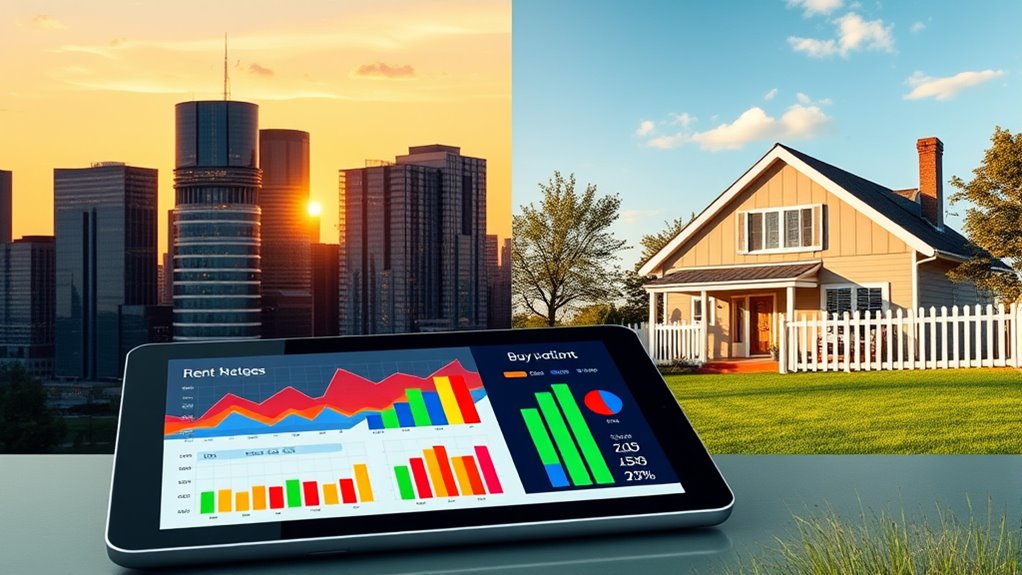In 2025, deciding whether to rent or buy depends on mortgage rates, home prices, and your long-term plans. If mortgage rates stay low and prices are manageable, buying can help you build equity and secure a good investment. But if rates rise or affordability shrinks, renting might be smarter for flexibility and lower upfront costs. To understand how these factors affect your best move, explore the details behind the current housing market.
Key Takeaways
- Low mortgage rates in 2025 make buying more attractive, but rising home prices may offset affordability benefits.
- High mortgage rates and elevated home prices could favor renting as a more cost-effective option.
- Long-term plans and stable finances influence whether homeownership or renting is the smarter choice.
- Market volatility and potential appreciation impact the investment value of buying versus renting.
- Staying informed on current interest rates and market trends is essential to making an informed decision.

Is 2025 the year to rent or buy? That’s the big question many are asking as the housing market continues to shift. With mortgage rates fluctuating and housing affordability remaining a concern, making this decision can feel overwhelming. Right now, mortgage rates are a key factor influencing whether you should contemplate buying. When rates are high, your monthly payments increase, making homeownership less appealing. Conversely, if rates drop or stabilize, buying becomes more attractive because you’ll pay less over the life of your loan. It’s essential to keep a close eye on these rates because they directly impact your ability to afford a home and the overall cost of borrowing.
Mortgage rates today shape whether buying a home is within reach or not. Stay informed.
Housing affordability is another critical element in this equation. Even if mortgage rates are low, rising home prices can negate those savings. In many markets, home prices have surged, pushing the barrier of affordability higher for first-time buyers. Renting can seem like a safer option when prices are sky-high, as it often requires less upfront cash and offers more flexibility. But if rents are also climbing fast, that can tilt the scales in favor of buying, especially if you plan to stay put for several years. The longer you stay in a home, the more you can offset initial costs, such as down payments and closing fees, making ownership potentially more economical over time. Considering the creation of equity and potential appreciation is also vital in this decision-making process.
Another factor to weigh is your financial stability. Renting may work well if your income is uncertain or if you’re saving for a larger down payment. Buying a home, however, can be a smart investment if you have steady income and are prepared for ongoing costs like property taxes, maintenance, and insurance. While the idea of building equity is appealing, it’s only beneficial if housing prices remain stable or increase. If the market dips, your investment could shrink, making the decision more complex.
Ultimately, whether you rent or buy in 2025 hinges on your personal finances, the current state of mortgage rates, and housing affordability in your area. If mortgage rates are low and prices are manageable, buying might make sense. But if rates are high and affordability is strained, renting could be the safer choice. Stay informed about market trends, assess your financial health, and consider how long you plan to stay in one place. These factors will help you make a smarter decision in an unpredictable housing landscape.
Frequently Asked Questions
How Will Inflation Impact Rent and Mortgage Rates in 2025?
Inflation will influence interest rate fluctuations in 2025, which directly impacts your rent and mortgage rates. As inflation rises, lenders often increase interest rates, making borrowing more expensive. This can reduce housing affordability, meaning your rent might go up, and new mortgage rates could climb. Staying aware of inflation trends helps you anticipate changes and plan your finances accordingly, ensuring you’re prepared for the shifting housing market landscape.
What Are the Tax Implications of Renting Versus Buying Next Year?
Thinking about your tax implications is like steering through a maze. When you buy, you can often claim tax deductions like mortgage interest and property taxes, which can lower your tax bill. Plus, if you sell your home later, you might benefit from capital gains exclusions. Renting, on the other hand, offers no tax deductions or capital gains advantages, making it less tax-efficient but more flexible financially.
How Does Local Market Variation Affect Rent-To-Buy Decisions?
When considering whether to rent or buy, local market variation plays a big role. You need to look at neighborhood affordability and regional market trends, as these factors influence prices and availability. In some areas, buying may be more cost-effective due to rising home values, while in others, renting might be cheaper because of higher property prices or slower market growth. Make sure to research your local market thoroughly before deciding.
Will Government Policies Favor Renters or Homebuyers in 2025?
Imagine the government’s policies as a tug-of-war, pulling between renters and homebuyers. In 2025, you might see more rent subsidies easing your monthly burden, making renting a smoother ride. Conversely, homeownership incentives could turn the tide, encouraging you to plant roots with tax breaks or assistance programs. Whether you lean toward renting or buying, these policies aim to tip the scales in your favor.
What Are the Long-Term Financial Risks of Renting Versus Buying?
When considering the long-term financial risks of renting versus buying, you need to weigh opportunity costs and equity buildup. Renting may seem cheaper upfront, but you miss out on building equity and potential appreciation. Buying builds equity over time, offering stability and investment growth. However, it comes with risks like market downturns and maintenance costs. You could face financial strain if property values decline or if you’re unable to keep up with payments.
Conclusion
As you weigh your options in 2025, remember that over 60% of homeowners see buying as a smarter long-term investment. While rent offers flexibility, owning can build equity and stability. Ultimately, your choice depends on your financial goals and lifestyle. So, crunch the numbers carefully—buying could save you thousands in the long run, but only if you’re ready for the commitment. Make an informed decision and choose what aligns best with your future plans.










